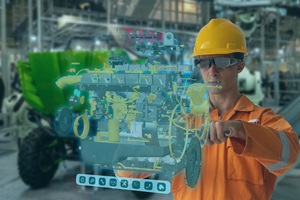Don’t believe the Industry 4.0 hype

Talk of Industry 4.0 has been useful in helping businesses understand the value of industrial automation and connectivity. But a lot of it is just hype, and many of the technologies are not being adopted as broadly or effectively as they could be.
Here, Sean Robinson, service leader at industrial IT and automation expert Novotek UK & Ireland, explains why it’s not only vital to work with a systems integrator to get the most from industrial connectivity, but to also take a grounded approach.
In the 32 years since Chuck D’s group, public enemy, rapped “Don’t Believe The Hype” in their same-titled single, it seems that we’ve become no less susceptible to hyperbole. After years of Industry 4.0 talk, it’s unbelievable to think that the idea of “Industry 5.0” is now being floated in some corners, that humans and machines will collaborate more fully to supply more bespoke products and services.
Industry 5.0 – Really?
To be fair, as with Industry 4.0, there is truth behind the “5.0” concept. Novotek’s customers in the food and beverage industries, in particular, are seeing the markets stagnate to some degree. This is pushing manufacturers towards smaller batch-sizes, more bespoke and customised products — otherwise known as discreet manufacturing — and greater collaboration between workers of varying skill sets and automation technologies, such as cobots.
However, whether we’re talking about Industry 4.0 or 5.0, it’s my view that businesses must see beyond the buzzwords. To illustrate my point, at Novotek we’ve been working with Manufacturing Execution Systems (MESs) since the term was first coined in the early 1990s. Yet, even today, the technologies are not being adopted as broadly or effectively as they could be. This similarly applies to the wider Industry 4.0 concept.
Take a grounded approach
It’s been suggested that businesses are not achieving lofty enough goals for Industry 4.0 to be considered a revolution. At Novotek, we recommend firstly taking a grounded approach. Secondly, being mindful of how all these systems are interconnected and connect back to your business.
A grounded approach means having specific goals that relate to your own company’s objectives. For example, instead of specifying a system to their current needs, businesses should be mindful that it must last over the next five, or even 10, years. This where the expertise of a systems integrator comes into play. We understand the pros and cons of systems available on the market.
Next, connecting these systems back to your business is dependent on how effectively you manage data. Historian software, like GE Digital’s Historian, can prove critical in this regard by gathering, archiving and compressing data together. Furthermore, the data can then be analysed and distributed — in real-time — among everybody within an organisation. That’s how big data can be matched to your goals.
Going back to the food and beverage sector, companies can achieve more through personalised data from customers, digital forecasting of changeable markets and real-time monitoring of processes and information.
While the hype of Industry 4.0 has helped light the spark that’s driving the world towards industrial connectivity, a grounded and truly integrated approach will be essential to getting the most value out of things like remote maintenance, predictive analysis and digital twins.
Historian software is just one way in which connectivity can be mapped to tangible business results, in the long-term — to ensure that Chuck D’s intonations of “Don’t Believe The Hype” might ring true for the next 30 years.
Comment on this article below or via Twitter:
Recent Posts
- What Is an Exoskeleton Suit?
- Where can you use an ultrasonic motor?
- Smart Camera: System That You Can Use for a Wide Variety of Purposes
- Why Is the Smart Toothbrush Better Than a Regular One?
- Microcontrollers: An Integral Part of Embedded Hardware
- Air Quality Monitoring System: Why It’s So Important in Modern Realities

